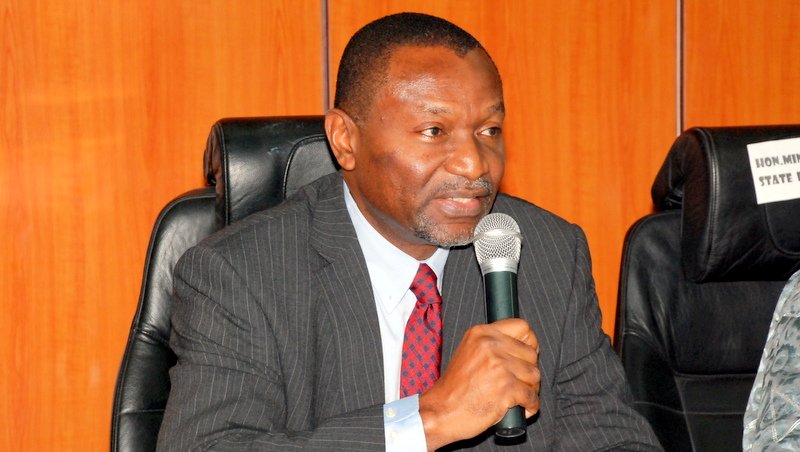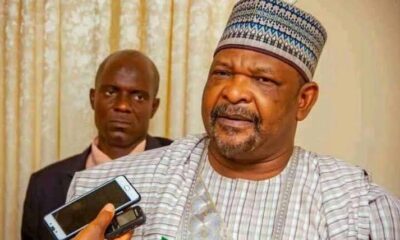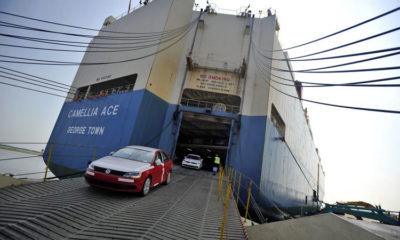- Why FG Couldn’t Achieve 2018 Revenue Target –Udoma
The Minister of Budget and National Planning, Senator Udo Udoma, explained why the Federal Government could not achieve its 2018 revenue target, stating that some one-off items listed for implementation in the fiscal year could not be actualised.
He gave the one-off items to include the N710bn from Oil Joint Venture Asset Restructuring and N320bn from the revision of the Oil Production Sharing Contract Legislation.
The minister said the one-off financing items had already been rolled over to the 2019 budget.
The 2018 budget, signed by President Muhammadu Buhari on June 20 last year, had total spending of N9.1tn.
The capital expenditure was to gulp 31.5 per cent of the total expenditure at N2.87tn, while recurrent non-debt spending was put at N3.51tn in 2018.
There was also a provision of N2.01tn for debt servicing, which is 21 per cent of the total budget while a provision of N177bn to retire maturing bond to local contractors was made by the government.
The N9.1tn budget was expected to be financed from N2.99tn to be generated from oil revenue, N31.25bn from Nigeria Liquefied Natural Gas dividend while N1.17bn was expected to be realised through revenue from minerals and mining.
To fund the budget, the Federal Government had planned to generate N658.55bn from Companies Income Tax and N207.51bn from Value Added Tax and N324.86bn from Customs while N57.87bn was expected to come from federation account levies.
In the same vein, the government was expected to raise N847.95bn through independent revenue from its agencies, while tax amnesty income, signature bonus and unspent balance from previous years were to provide N87.84bn, N114.3bn and N250bn, respectively.
Speaking during a meeting with the House of Representatives Joint Committee on Finance, Appropriation, Planning and Economic Development on the 2019 revenue and expenditure projections as contained in the Medium Term Expenditure Framework and Fiscal Strategy Paper 2019-2021, the minister stated that the Federal Government was determined to improve its revenue generation this year.
Details of the fiscal operations of the Federal Government as contained in the Central Bank of Nigeria’s economic report for the fourth quarter of 2018 showed that the government had not been able to generate adequate revenue to meet its expenditure.
For example, in the first quarter of last year, the Federal Government’s retained revenue was put at N884.88bn while its expenditure was N2.01tn. This resulted in a fiscal deficit of about N1.13tn.
In the second quarter of last year, the Federal Government earned N1.12tn while its expenditure was N1.63tn, resulting in a deficit of N504.8bn.
For the third quarter, the revenue of the Federal Government was put at N1.03tn with the expenditure of N1.89tn, leading to a deficit of N855.09bn.
For the fourth quarter, the fiscal deficit widened to N910.4bn as the government was only able to generate N916.44bn to take care of its total expenditure of N1.82tn
But the minister said the government was already taking a number of steps to shore up revenue to fund the 2019 budget.
Among other initiatives aimed at expanding the fiscal space, the minister stated that the Federal Government would intensify efforts to improve public financial management through the comprehensive implementation of the Treasury Single Account, the Government Integrated Financial Management Information System and the Integrated Payroll and Personnel Information System.
Also, he said the Department of Petroleum Resources had been directed to, within three months, complete the collection of past dues on oil licence and royalty charges, including those due from the Nigerian Petroleum Development Company which it had agreed to pay since 2017.
Udoma also said the Ministry of Finance, working with all the relevant agencies, had been authorised to take action to liquidate all recovered, unencumbered assets within six months.
Among other revenue generating initiatives, he said the President had directed that work should be immediately concluded on the deployment of the National Trade Window and other technologies to enhance customs collections efficiency from the current 64 per cent to up to 90 per cent over the next few years.
He indicated that in spite of the challenges that militated against the realisation of targeted revenues, the revenues generated in 2018 showed a significant improvement over that of 2017.
The minister said he expected further improvement this year with the sustained implementation of the Economic Recovery and Growth Plan.
The minister explained that the ERGP guided allocations in the Federal Government budget because it sets out the key execution priorities of the government for the growth and development of the economy.
The government, he added, was encouraged by the results so far attained after implementing the plan for about two years.
He said the economy had exited recession and was on the path of growth, even though it took time for the impact to be fully felt by a significant number of people.
“It takes time, and will take some more efforts but we will keep working on it so as to fully realise the objectives of the ERGP. The implementation of the ERGP will create growth and jobs and reduce poverty,” he said.
Explaining the basis for some of the assumptions in the MTEF/FSP, the minister said the oil price benchmark was arrived at after extensive consultations with industry experts and consultants.
He expressed optimism that the $60 per barrel crude oil benchmark projected for 2019 was achievable as oil was currently trading at about $67 per barrel.
On the limitation imposed by OPEC production quota, the minister explained that there was no quota set for condensates by OPEC.
Nigeria, he said, could use condensate production to augment its production.
“Mr President has directed the NNPC to take all possible measures to achieve the targeted oil production of 2.3 million barrels per day,” he added.
He explained that in allocating funds in the 2019 budget proposals, priority was given to critical infrastructure projects.

 Naira4 weeks ago
Naira4 weeks ago
 Naira3 weeks ago
Naira3 weeks ago


 Naira4 weeks ago
Naira4 weeks ago




 Naira3 weeks ago
Naira3 weeks ago
 Commodities4 weeks ago
Commodities4 weeks ago


 Sport Business4 weeks ago
Sport Business4 weeks ago


 News3 weeks ago
News3 weeks ago


 Banking Sector4 weeks ago
Banking Sector4 weeks ago





















